| Author | Message | ||
Charles Aldous-Ball Yet to post message Username: chaf29 Post Number: 1 Registered: 3-2018 |
Recently aquired GWX79 20/25, but having trouble running too rich, resulting in backfiring and significant hesitation when hot, checked spark plugs, which are new and were found to be sooty, I have renewed all the HT leads as the old ones were stiff with age, to run I have to have the carb lever set near on weak, but have a suspicion that the Starting Carburettor is not working correctly,I turn the lever on the dash to on, it clicks and the connecting rod turns, but makes no difference to the running or starting of the engine, could this be stuck somewhere and hence my problem for running so rich, if so does any member know how I can check to see if the starting carburettor is the problem. New to the forum so any help would be greatly appreciated. | ||
Christian S. Hansen Grand Master Username: enquiring_mind Post Number: 757 Registered: 4-2015 |
Is your exhaust sooty as well? If starting carburetor is running all the time, that is definitely not desirable. Were it me, I would be considering testing by cutting off (disconnecting) fuel feed to starting carburetor and determine if there are any changes in symptoms. That the position of the starting carb makes no difference to the symptom is suspicious as depending on whether it is on or off SHOULD instantly change running conditions such that there is no mistake between the two settings. . | ||
Charles Aldous-Ball New User Username: chaf29 Post Number: 2 Registered: 3-2018 |
Hi Christian, thank you for your reply, greatly appreciated, and yes the exhaust is sooty as well, I will follow your advice and disconnect the fuel feed to the starting carburetor to ascertain if there are any changes in symptoms and let you know. | ||
Christian S. Hansen Grand Master Username: enquiring_mind Post Number: 758 Registered: 4-2015 |
Charles... Do you have the owner manual? I have run you astray inadvertently by without checking the manual first and thinking that the 20/25 has a completely separate starting carburetor as on both the Phantom I and Phantom II which is set into the intake manifold and fed by induction vacuum from the main carburetor. In those cases it is a simple matter of disconnecting the feed line. I just checked the 20/25 manual as it has been years since I have even opened the bonnet on my own 20/25 and I see that the "starting carburetor" is contained within the main carburetor as a separate needle and is thus not available to being simply disconnected as in the Phantoms. In this case you will need to follow the detailed manual instructions for resetting not only the starting needle but likely also the slow and fast idle needles and operating under the assumption that those settings have become deranged by some previous hands. Sorry to have led you astray, but the bottom line is that something is definitely wrong and you need to start from square one and reset everything. If you do not have the manual (and I have not checked the tech library to see if posted there) you are welcome to PM me with your email and I can scan the pages and send to you. . | ||
Charles Aldous-Ball New User Username: chaf29 Post Number: 3 Registered: 3-2018 |
Christian Thank you for the information and yes I managed to find a copy of the section of the owners manual that deals with the resetting of the carburetor on the 20/25 and therefore will reset the needles as specified. I can confirm that the carburetor was dismantled and cleaned by a mechanic a few months ago prior to I purchased the car, as it had been in storage for a number of years, the mechanic informed me that they had problems with resetting the needles and not to alter the thumb lever as it will run to rich, which as in my previous message is set just a few clicks away from weak and still runs rich. However, I am not sure if they followed the correct procedure as specified in the manual of resetting the carburetor so I will start from square one as you have advised and will let you know how I get on. Many thanks its very appreciated. | ||
Jonas TRACHSEL Prolific User Username: jonas_trachsel Post Number: 164 Registered: 2-2005 |
Charles In the Technical Library - PreWar you will find an owners manual for the 20/25 HP I have scanned many moons ago. Tip: Before you start to adjust anything on your carb I would mark the actual settings, so that you could return to it any time if your adjusting is not sucessful and start from point zero again. At least your car is running with the actual setting, if not perfect. | ||
Christian S. Hansen Grand Master Username: enquiring_mind Post Number: 759 Registered: 4-2015 |
Charles... Also, suggest doing one thing at a time in isolation. Since the starting carb is suspect, I would start there and adjust the thumbscrew (M in figure 22) per manual first. Out of curiosity might also remove the assembly (Cap N) to be sure nothing visibly amiss. I think the primary objective is to get the mechanism set such that turning the starting carb on and off noticeably affects the running. It is basically a "choke" and as with any other engine, turning the choke on (moving dash thumb lever from run to start) generally causes unmistakable disruption to the running...often quickly flooding and killing the engine. If this happens, it is evidence that the starting carb (a.k.a. "choke") is doing its job. Ideally once there, the engine may finally run properly and adjusting slow and fast jets unnecessary. Ideally anyway. Good luck! P.S. Not sure what the previous "hands" on the carb meant by the caution to not alter the "thumb lever" as if he meant the mixture control on the steering quadrant, it is there for the very purpose of being altered to adjust for conditions as necessary, and if the starting carb thumb lever on the dash, the same applies...designed and intended to be used for adjustment under starting conditions. . | ||
Charles Aldous-Ball New User Username: chaf29 Post Number: 4 Registered: 3-2018 |
Christian I will follow your advice and take a look and make sure nothing is amiss in the starting carburetor and adjust as per manual, with fingers crossed that I may not have to reset the slow and fast jets. I must admit I was confused myself when the mechanic advised me not to alter the mixture control on the steering quadrant, he said that was the best position to stop it running rich, which isn't the case anyway. Will let you know how I get on. | ||
Christian S. Hansen Grand Master Username: enquiring_mind Post Number: 762 Registered: 4-2015 |
Forgive me if too critical, but when someone gives you advice like that. it puts their veracity and experience into question and constitutes cause to suspect everything else their hands touched, rebuilt, or adjusted as well. As you will find when owning and maintaining these older cars (the newer ones as well) you spend a lot of time first discovering and then putting right the things that previous hands have "fixed". . | ||
Charles Aldous-Ball New User Username: chaf29 Post Number: 5 Registered: 3-2018 |
Christian No need to forgive for being critical its so true, particularly in my case with the carburetor, its a hard lesson sometimes, and you are right there are a few things that I have already discovered after taking ownership of the car, which fortunately with my limited knowledge I was able to put right. | ||
Jonas TRACHSEL Prolific User Username: jonas_trachsel Post Number: 165 Registered: 2-2005 |
Charles You write "set just a few clicks away from weak". This is the correct position for this lever on the steering wheel boss for normal running with engine warm. You may try going notch-by-notch towards Weak until you feel the engine loosing power or even producing an occasional misfire, then go one notch back towards Strong for easy-going on the flat and probably one more notch, when power is needed e.g. going uphill. When the engine pops into the exhaust going downhill you have too lean a mixture. Then adjust this lever towards Strong until the popping stops. For normal driving you adjust the ignition lever on the steering wheel boss to full Early. Fully to Late is for engine starting only. A midway position of this lever is desirable for very slow driving, say in a parade or for prolonged idling. | ||
Charles Aldous-Ball New User Username: chaf29 Post Number: 6 Registered: 3-2018 |
Hi Jonas I appreciate the information, extremely useful, I still have my learner plates on for the starting and driving of the 20/25 so lots to learn. | ||
Charles Aldous-Ball New User Username: chaf29 Post Number: 7 Registered: 3-2018 |
Hi Christian I unscrewed the cap on the starting carburetor carefully cleaned the piston, couldn't see nothing amiss in there, however, when I came to adjust the thumbscrew screw for regulating the jet, I went to screw it down as specified and to my surprise it was already at its limit, not sure if the mechanic forgot to adjust it? I therefore adjusted the screw to the recommended one and half turns, started the engine, adjusted the mixture control on the steering quadrant, and the engine certainly runs better. However, with my fingers crossed I turned the starter carburetor on to see what happens and it made no difference to the running of the engine, any ideas where I go from here for checks why the starting carburetor is not functioning. | ||
Christian S. Hansen Grand Master Username: enquiring_mind Post Number: 765 Registered: 4-2015 |
Well, that's good progress anyway. Is the exhaust still sooty? Once engine is running and up to temperature, does moving the mixture to neither extreme (strong, weak) affect the idle? It should and if so, another good. As to the starting carb, as long as you can start the engine without it and as long as engine runs smoothly and no longer sooty exhaust, another good and then the question is why starting carb seems to have no effect. I suppose that checking to see that the lever position on the dash actually affects the position on the carb would be desirable to verify. Disconnecting the linkage at the carb in order to determine if indeed the start and run positions on the dash correspond to the on and off positions on the carb is the objective. With linkage disconnected, you can simulate the on-off manually at the carb and see if that disrupts the idle as it should since you are in effect choking and richening the mixture. If it does, then the linkage adjustment is suspect. If it does not, I am at a loss as so what to test next. Hopefully others of the prewar experienced members will better direct your efforts in investigating. Keep us updated. . | ||
Charles Aldous-Ball New User Username: chaf29 Post Number: 8 Registered: 3-2018 |
Christian Checked exhaust after running up to temperature not sooty, moved the mixture control to strong and then weak and yes the movement does affect the idle, so that works. The engine does start after about half-dozen button presses without the starter carburetor. I will follow your advice and carry out the checks on the starter carburetor, and update you after investigations. | ||
Charles Aldous-Ball New User Username: chaf29 Post Number: 9 Registered: 3-2018 |
Christian Now that Easter has been and gone I thought that I would take a look at the linkage for the starting carb, but before I start dismantling, can you tell me how far the starting carb thumb lever suppose to move from the off to on position, mine goes from the off position at 6 and extends to about 1 upon which it then clicks, however, looking at the linkage that extends out of the bulkhead the click turns out to be the linkage hitting the fuse box. Someone previously has removed the engraved facia of the starting carb thumb lever, not sure why, but it seems to me as though the thumb lever extends to far. I thought as I am going to dismantle the section of the linkage from the bulkhead to see if the starting carb works manually, I don't want to reassemble if its wrong. Any advice would be greatly appreciated. | ||
Christian S. Hansen Grand Master Username: enquiring_mind Post Number: 768 Registered: 4-2015 |
Charles... Yes, I was wondering about your description of a click...which seemed odd. Unfortunately all of my small horsepower pre-war cars (20/25, 25/30, and Derby Bentley) all of which have the similar thumb lever on the dash are in another state and I will not be near them until a month or two. My recollection is that the complete travel from run to start was about 90 degrees and (if I recall) the run position was at 6 o'clock and the start position was at 9 o'clock. The motion was smooth and fluid and was simply the movement of the linkage. Wish I could be of more help. Take photos and make notes of positions of things. Be careful taking things apart as the screws and nuts are VERY small. Rig something up under the work area to catch things that you may drop as it WILL happen! From what you are saying, it seems possible that there is too much travel but this is something you are going to have to determine in the field. I would be inclined to disconnect linkage at carb (or any other convenient junction of the linkage in the engine compartment that will allow you to isolate the carb from the thumb knob) and determine the extent of travel there and then adjust linkage accordingly so that this travel is translated to the dash thumb lever. Hopefully you will find some prior "adjustment" that is in error. The object is to isolate the carb so that it can be choked manually and verify that this does (as it properly should) make a noticeable difference as the choke is turned on and off and then reassemble so that this can be controlled from dash knob. Keep us posted. . | ||
Jonas TRACHSEL Prolific User Username: jonas_trachsel Post Number: 166 Registered: 2-2005 |
Charles The thumblever for the starting carburetor on the dash points to 6 o'clock for "Run" and to 3 o'clock for starting, not to 9 o'clock as Christian writes. It is spring-loaded in the "Start"-position. The linkage definitely should never have a chance to hit the fuse box. I think your linkage is fitted in the wrong orientation. The bellcrank next to the fuse box should look towards the engine, not towards the fuse box. If you so desire, I can take and send photos of the linkage as fitted to GZU7 in my garage. JoT | ||
Charles Aldous-Ball New User Username: chaf29 Post Number: 10 Registered: 3-2018 |
Christian Thank you for the information, very much appreciated, I take note of the small screws and nuts, of which i have previously found out on another vintage car to my detriment. I will keep you posted. | ||
Charles Aldous-Ball Experienced User Username: chaf29 Post Number: 11 Registered: 3-2018 |
Jonas Thank you for the info, I think you are correct that something is not right, the bell-crank of the linkage points more in an upward direction, but hits the fuse box when turned on the dashboard, seems a lot of play even though the return spring is fitted. I would be very grateful if you could send me photos of the linkage fitted on your GZU7, it may give me some insight to see what the previous owner has done. | ||
Jonas TRACHSEL Prolific User Username: jonas_trachsel Post Number: 168 Registered: 2-2005 |
Charles Here are two shots of the bellcrank next to the fuse box. Pix 1 shows the bellcrank in the "run"-position: 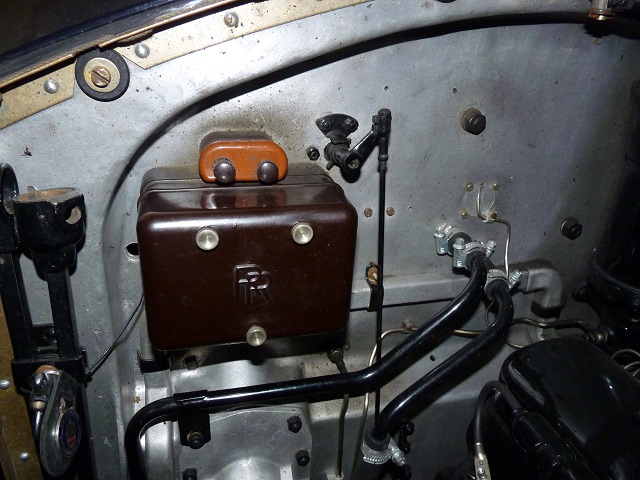 Pix 2 shows the bellcrank in the "start"-position: 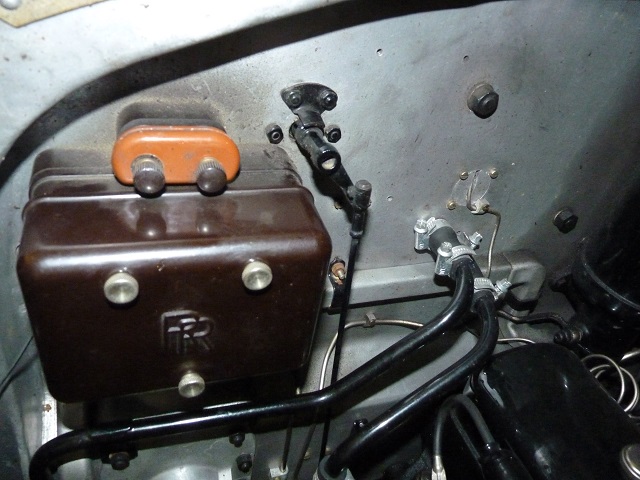 I have to redo the shot of the arrangement at the base of the bulkhead, as it is not sharp enough to see the details. But here it is anyway: 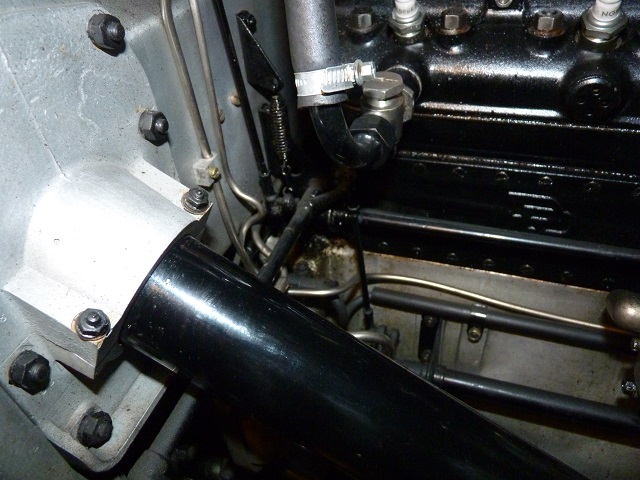 Hope this is of some help to identify the arrangement. JoT | ||
Jonas TRACHSEL Prolific User Username: jonas_trachsel Post Number: 169 Registered: 2-2005 |
Charles I have now taken pictures of the actuating mechanism at the lower end of the bulkhead. It was quite awkward to get the camera in a position where no other items obscured/shadowed the important linkages. The first picture shows the linkage outlined in red in the "start" position. Outlined green is the retracting spring to the "run" position: 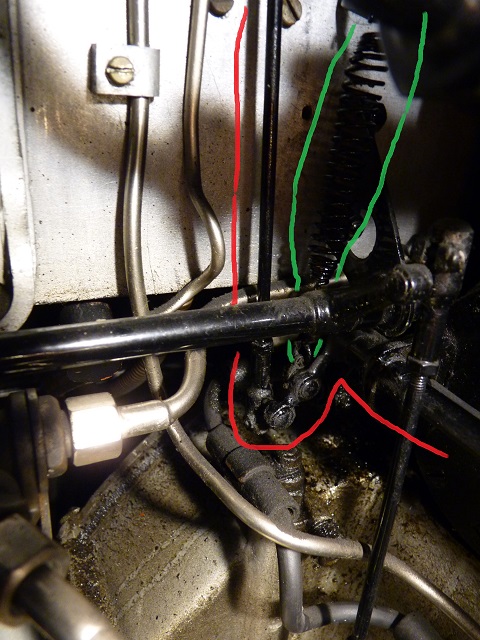 The vertical pushrod actuates a bellcrank that transmits the movement to a horizontal shaft running along the engine. This shaft directly enters the carburetor body at its lower end quite close to the engine. This is so hidden behind the carb that I was unable to take a picture. Shame on me for that dirty engine.... JoT | ||
Jonas TRACHSEL Prolific User Username: jonas_trachsel Post Number: 170 Registered: 2-2005 |
Next picture shows the linkage in the "run" position:  And one more picture in "start" position for good measure: 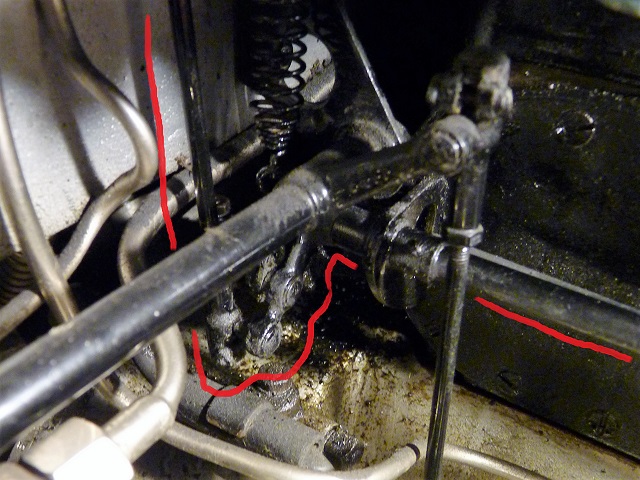 | ||
Charles Aldous-Ball Experienced User Username: chaf29 Post Number: 12 Registered: 3-2018 |
Jonas Cant thank you enough for the time that you have spent taking the photos and for the illustration of the moving linkage its very much appreciated, they are so useful and informative I can now check my linkage against the photos and see what's going on, I will also obviously dismantle the linkage to check the function of the starting carb. I thought your engine looked clean, compared to mine. Will keep you posted and try and also send some photos. | ||
Christian S. Hansen Grand Master Username: enquiring_mind Post Number: 769 Registered: 4-2015 |
Jonas... Correct me if I am in error in terms of the influence of the starting jet on an already running and warmed up engine. Earlier in the thread I noted that the other small chassis vehicles also have the thumb knob on the dash which while true may not be accurately reflective of the instant issue given that they make the choke operate thru a butterfly valve in the intake throat which when closed by the thumbscrew richens the mixture by restricting air flow whereas the 20/25 carb richens the mixture by a movable jet that changes the amount of gas rather than restricting the amount of air. Whereas the butterfly choke will kill a running engine when closed, am I correct that the starting jet variant will do the same? I presume that is what happens and that Charles will be able to verify the jet operation by manipulating it manually with linkage disconnected from the dash knob... or do I err? What happens with your engine when you turn the dash knob to "start" on a running engine? Does it flood the engine and cause it to stumble? . | ||
Jonas TRACHSEL Prolific User Username: jonas_trachsel Post Number: 171 Registered: 2-2005 |
Christian I never tried to engage the starter carb when the engine is fully warmed, so I cannot tell you what will happen in this case. As per today, GZU7 is still in hibernation, so I cannot go out and try it out. JoT 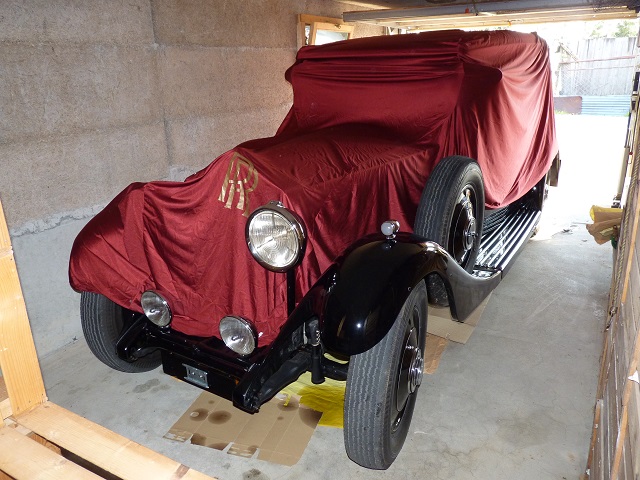 | ||
Patrick Lockyer. Grand Master Username: pat_lockyer Post Number: 1834 Registered: 9-2004 |
This may help but the setting of the carb was done many years ago, linkage first! http://au.rrforums.net/forum/messages/16999/1986.html?1138275515 Nick Brough Unregistered guest Posted From: 81.76.126.80 Posted on Friday, 24 December, 2004 - 03:54 am: Edit PostDelete PostView Post/Check IP Hi, I have just bought a 1931 Rolls 20/25 and she is a reluctant starter can anyone advise me of the correct procedure for starting. Also, I cannot seem to change down without crunching the gears. On my 1935 Brough Superior I simpley double de clutch quickly and give a short blip on the accelerator during th process. Do I need a different technique for the Rolls. Any advice would be gratefully recieved. Thanks Nick Top of pagePrevious messageNext messageBottom of page Link to this message Patrick Lockyer. Grand Master Username: pat_lockyer Post Number: 177 Registered: 9-2004 Posted on Friday, 24 December, 2004 - 05:05 am: Edit PostDelete PostView Post/Check IP Hi Nick. If the car has been used recently procceed by first turning the fuel on with the tap on the dashboard to "m" or main. There are two other positions will say about the later! Next turn ignition switch "on" to the right to the "I and c". Make sure the gear lever is in nutral and the handbrake on. Set the thumb lever on the dash to start.[Strong on early cars] Fully retard the ignition and move the hand throttle half way up the quadrant. The starter button can now be depressed not sure if it is starter pedal or button. Should fire up almost stait away. When warm move lever to Normal. When engine is fully warmed up move lever to Run. If it does not proceed to start as above then we must look at other points. From memory the other tap positions are "r" reserve 2.5galls. "O" fuel off. On the gear box side you just misted the syncromesh box that came in on chassis no GKT 22 1932. My advise is double de clutch and change gear briskly As you are doing with that spendid bike that you have. A novice "sorry" will soon be experenced with practice! I can put some pix of a 1929 twenty with Auto vac and the manualy operated vertical rad shutters,and a folding rear back body of progessing stages of restoration over the comming months. Top of pagePrevious messageNext messageBottom of page Link to this message Nick Brough Unregistered guest Posted From: 84.65.51.144 Posted on Sunday, 26 December, 2004 - 06:57 am: Edit PostDelete PostView Post/Check IP Pat, Thanks for the info, the Brough is actually a car not a bike. They built a few she is one of the few 8 cylinder models. They used Hudson 8 running gear. Nick Top of pagePrevious messageNext messageBottom of page Link to this message Stephe Boddice Unregistered guest Posted From: 84.67.63.158 Posted on Tuesday, 28 December, 2004 - 02:47 am: Edit PostDelete PostView Post/Check IP Nick, The 20/25 had several variations of the carburettor fitted during its production life - all being of the same basic design. Rather than using a choke flap these Rolls-Royce designed carburettors incorporated a 'starting carburettor' within the main body of the unit. The starting carb is identified by a knurled screw, held by a lock nut, protruding vertically from the top of the carb adjacent to the float chamber lid. Adjustment is required for climate/temperatue. Slacken the lock nut, turn the screw down (clockwise) until it closes the jet - use finger pressure only - and then unscrew by between 1-1/4 and 1-3/4 turns; tighten the locknut. The further out the adjusting jet is turned the richer the mixture. If you are in a temperate climate you should need only 1-1/4 to 1-1/2 turns. When the starting carb is correctly set the hand throttle should be FULLY closed when starting from cold - otherwise the engine will not start. As the starting carb is released the hand throttle should be opened. The starting carb should be completely closed off withing a maximum of 30 seconds from ignition - even in the coldest of conditions. Regarding the advance/retard lever - this should be set at half way. Full retard on starting should only be applied when using the starting handle with magneto ignition. All other instructions are as per Patrick Lockyers posting. The gearbox should be lubricated with SAE30 or a mineral multigrade of 20w50. These gearboxes do take some time to warm up; gear changing is much easier once the oil is hot. Standard double de-clutching will then work. Make sure that there is adequate free-play on the clutch pedal when in the released position. There is no pedal-return spring on the 20/25 so it is important that there is at least 1/2 an inch free movement when the floor boards are in position - otherwise you will suffer terminal clutch slip. Hope that this helps (rather than confuses) Stephe Boddice Rough set up showing the cold starting device. 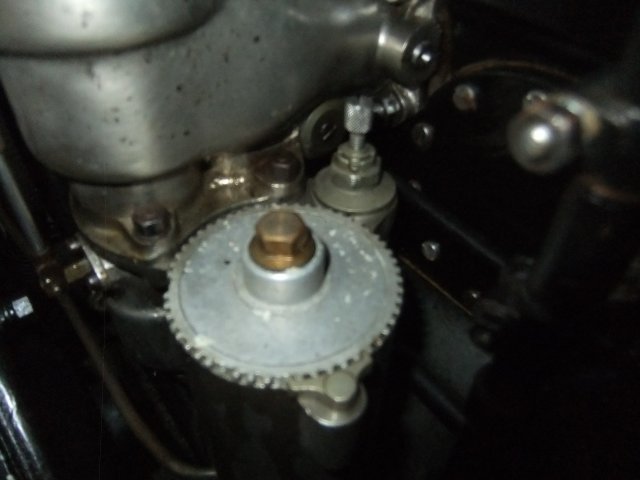 mixture control linkage in the weak position. 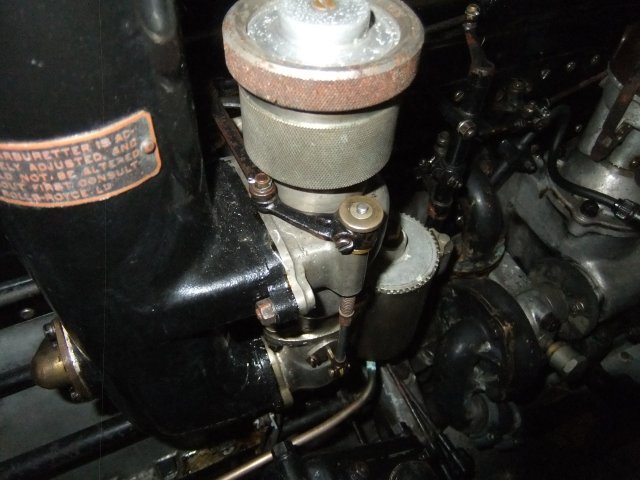 mixture control in the full strong [rich] position  | ||
Charles Aldous-Ball Experienced User Username: chaf29 Post Number: 13 Registered: 3-2018 |
Patrick Thanks for the info, having looked at the mixture control for strong and weak as the photos that you kindly submitted, something is amiss on my mixture control linkage, if I turn the mixture control to strong - (rich) the linkage turns in the opposite direction that is as shown in your photos, ie to weak and for weak as your photo the linkage turns to strong, do you think the linkage has been set up completely wrong and this could be part of my problem with the starting carb. | ||
Christian S. Hansen Grand Master Username: enquiring_mind Post Number: 770 Registered: 4-2015 |
While anything may be possible, my guess would be that the photos are labeled in reverse rather than the linkage being installed in reverse. In any event the mixture setting has no relation to the starting jet setting however if your mixture linkage is indeed somehow in reverse then you will be attempting to start with the mixture fully weak instead of fully strong and this would likely affect starting as well as running. Also be sure that the throttle is fully closed when first starting and then once engine fires immediately opened a bit. When throttle is fully closed you get maximum suction vacuum which aids the starting jet feeding gas to the carb. As his time allows, no doubt Jonas will be able to view his engine to determine the accuracy of the photos, as well as Stephe Boddice, who is a superb gentleman and owner of another splendid 20/25. For vicarious interest you should see his website on the 20/25 engine rebuild. Jonas has also contributed a very illustrative section on hub removal. Both of those guys are the tops in my book! Not pandering, just the facts. . | ||
Patrick Lockyer. Grand Master Username: pat_lockyer Post Number: 1836 Registered: 9-2004 |
Will check again ASAP. | ||
Jonas TRACHSEL Prolific User Username: jonas_trachsel Post Number: 174 Registered: 2-2005 |
Charles, Christian I will check the correct position of the mixture control linkage at "strong" resp. "weak" settings as soon as I return from a long weekend. This may be rather on Tuesday and not on Monday. Jonas | ||
Charles Aldous-Ball Experienced User Username: chaf29 Post Number: 14 Registered: 3-2018 |
Christian, Jonas & Patrick Many thanks and fingers crossed that the photos are labelled in reverse and look forward to confirmation on the correct position. Have checked the website for Stephe Boddice and Jonas very impressive, well illustrated and informative. | ||
Patrick Lockyer. Grand Master Username: pat_lockyer Post Number: 1838 Registered: 9-2004 |
Trip to the workshop to check my memory [ok] and pixs with the cars linkage. Fact for one! Weak position pix:  Linkage set weak [position: 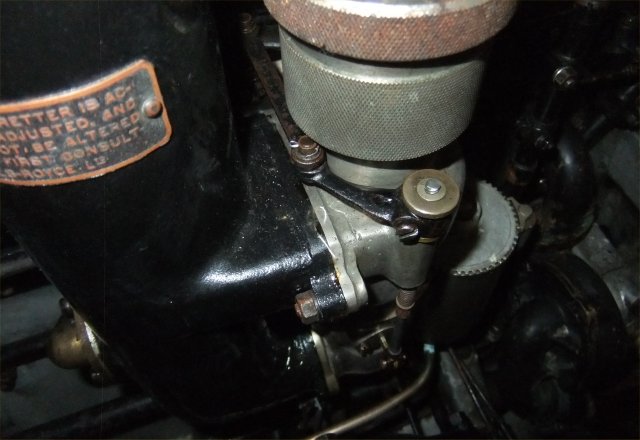 Rough jet position of starting device:  | ||
Jonas TRACHSEL Prolific User Username: jonas_trachsel Post Number: 176 Registered: 2-2005 |
Patrick has confirmed with his above photos the linkage position for the "weak"-setting correctly. So no need for me to send any more pictures. Hope you can now find where so-called mechanics have erred in installing the linkages in the past. JoT | ||
Charles Aldous-Ball Experienced User Username: chaf29 Post Number: 15 Registered: 3-2018 |
Patrick Appreciate your time in sending the confirmation photos and pleased that your memory is ok. I am aware as I previously stated in the forum that the carburetor was stripped, I think Jonas has hit the nail on the head that the work was carried out by so-called mechanics and fortunately I know where the work was carried out, its no wonder that they had a job adjusting the carb. Can't thank you all enough on this forum for all the advice and direction that you have given me, its been greatly appreciated. Will now try and sort out the mess that the "mechanic" has done and will keep you posted. | ||
Charles Aldous-Ball Experienced User Username: chaf29 Post Number: 16 Registered: 3-2018 |
Christian At long last I found time to disconnect and isolate the starting carb linkage and when I manipulated the starting carb manually the engine did start to run rough, when released the engine was running back to normal, so you are correct in that it is the linkage that is amiss and will need adjusting, which at least its a better outcome than it could have been. I think for me its been a real eyeopener and a worry when so called "mechanics" can get it so wrong even on the position of the strong and weak setting linkage. However, I must take this opportunity to thank everyone particularly Christian, Jonas & Patrick for all your help and advice its been invaluable, and I am sure there will be other questions that I will need to ask in the not to distant future. | ||
Christian S. Hansen Grand Master Username: enquiring_mind Post Number: 776 Registered: 4-2015 |
Glad to hear you are narrowing in on things. As to "previous hands on things", the number of people who are truly able to work with these machines is very limited and your experience is not the least bit surprising. One of the worst things that can happen to an older RR other than not having been worked on, is someone having worked on it! No offense to Paul Yorke or Jim Walters intended as they are among the "very limited". In another thread, David Balfour apparently even had trouble getting drive belts properly tensioned. As you get to know your chassis, the more you learn and are able to self service, the better and there is considerable satisfaction to be derived thereby. Bottom line is do not let the "average Joe" with a tool box anywhere near your RR. . | ||
Patrick Lockyer. Grand Master Username: pat_lockyer Post Number: 1848 Registered: 9-2004 |
Totally agree one only has to work on a simple engine with the dismantling of parts only to find some idiot has been there and taken to the hammer! pix: Phantom 2 hammer damage.  |